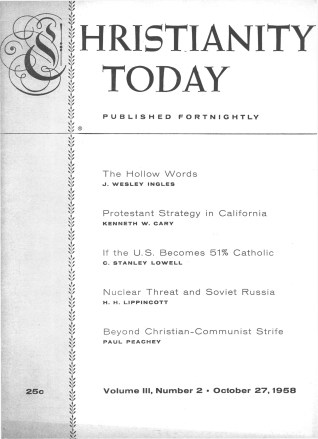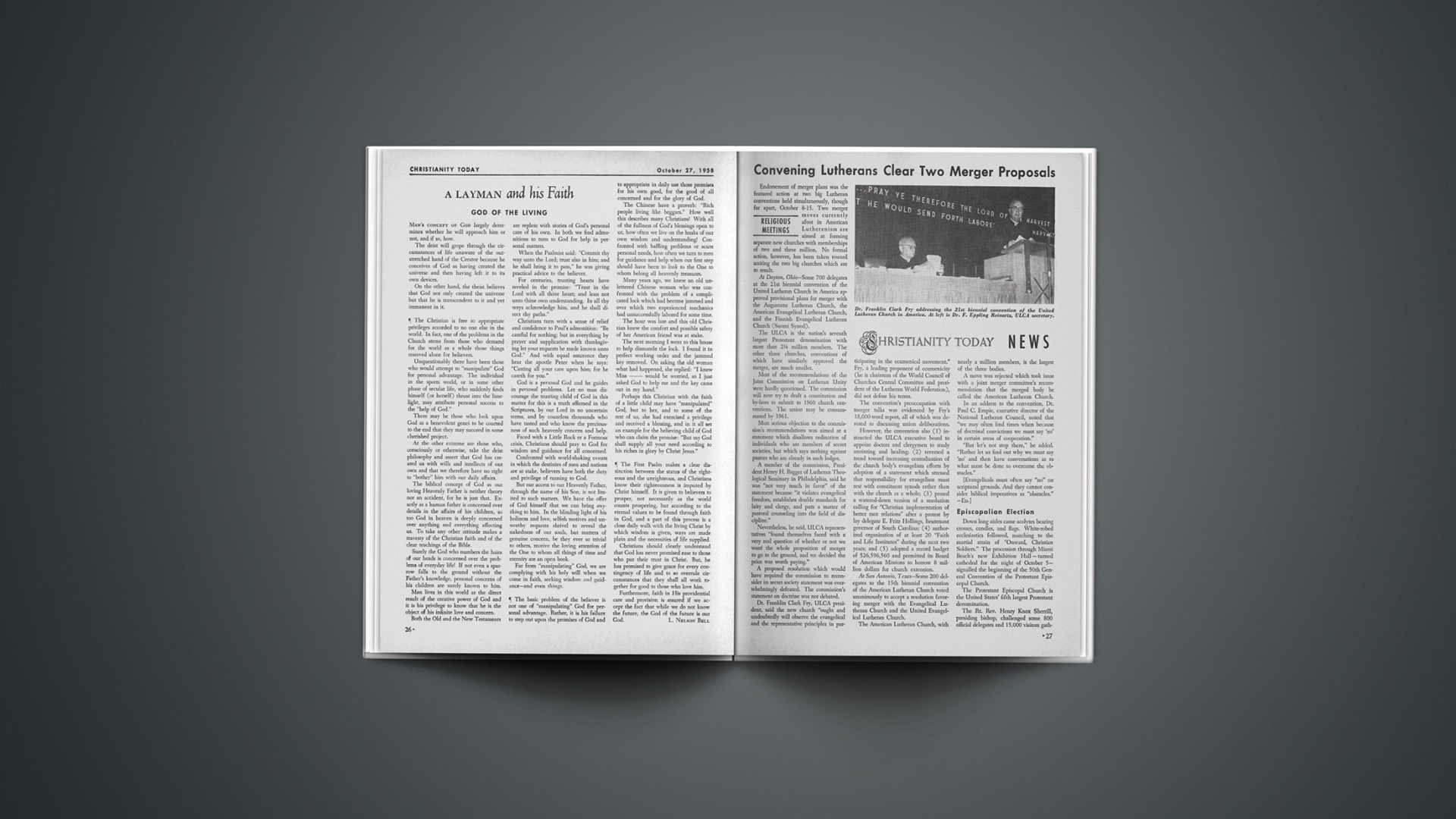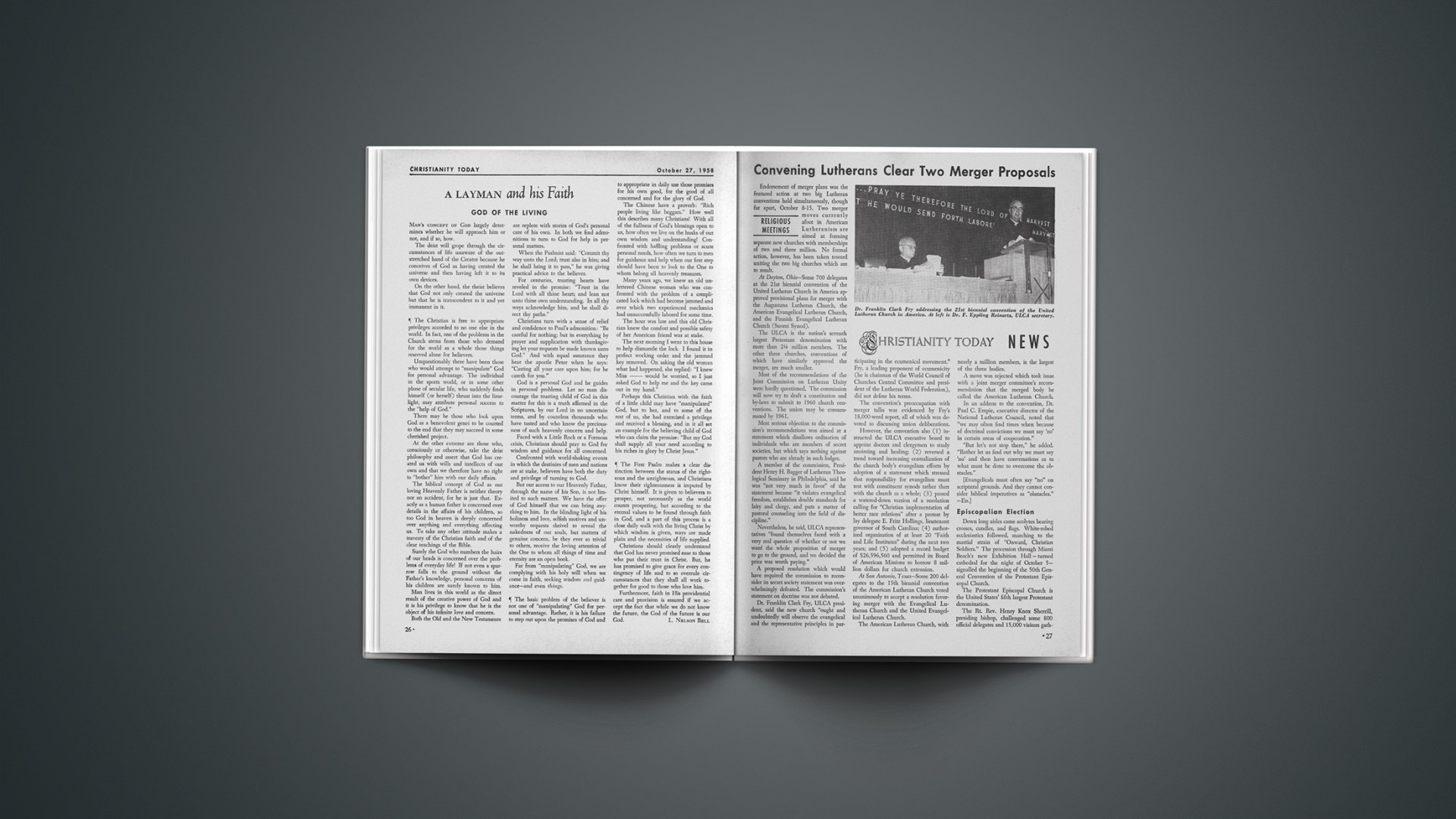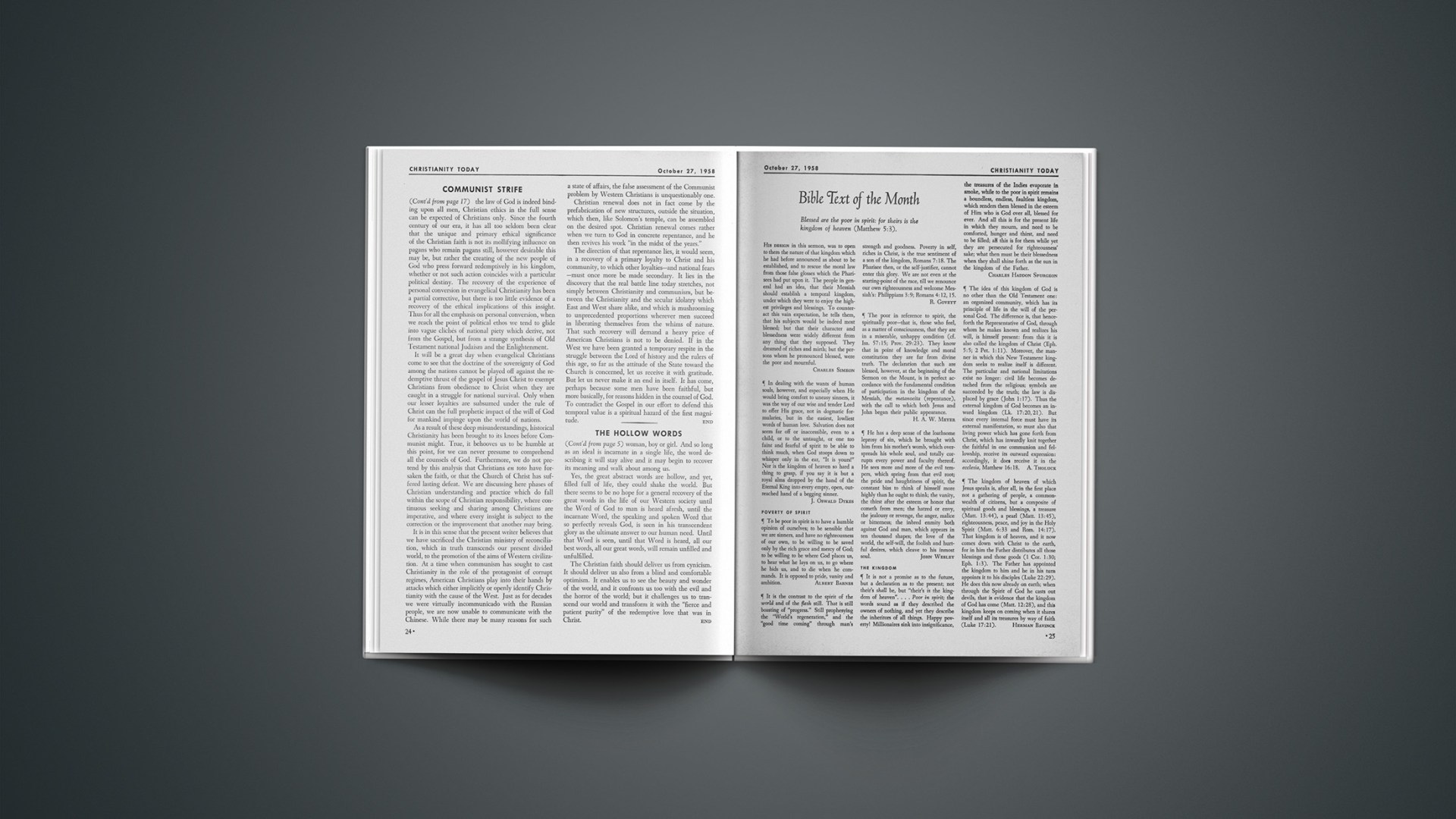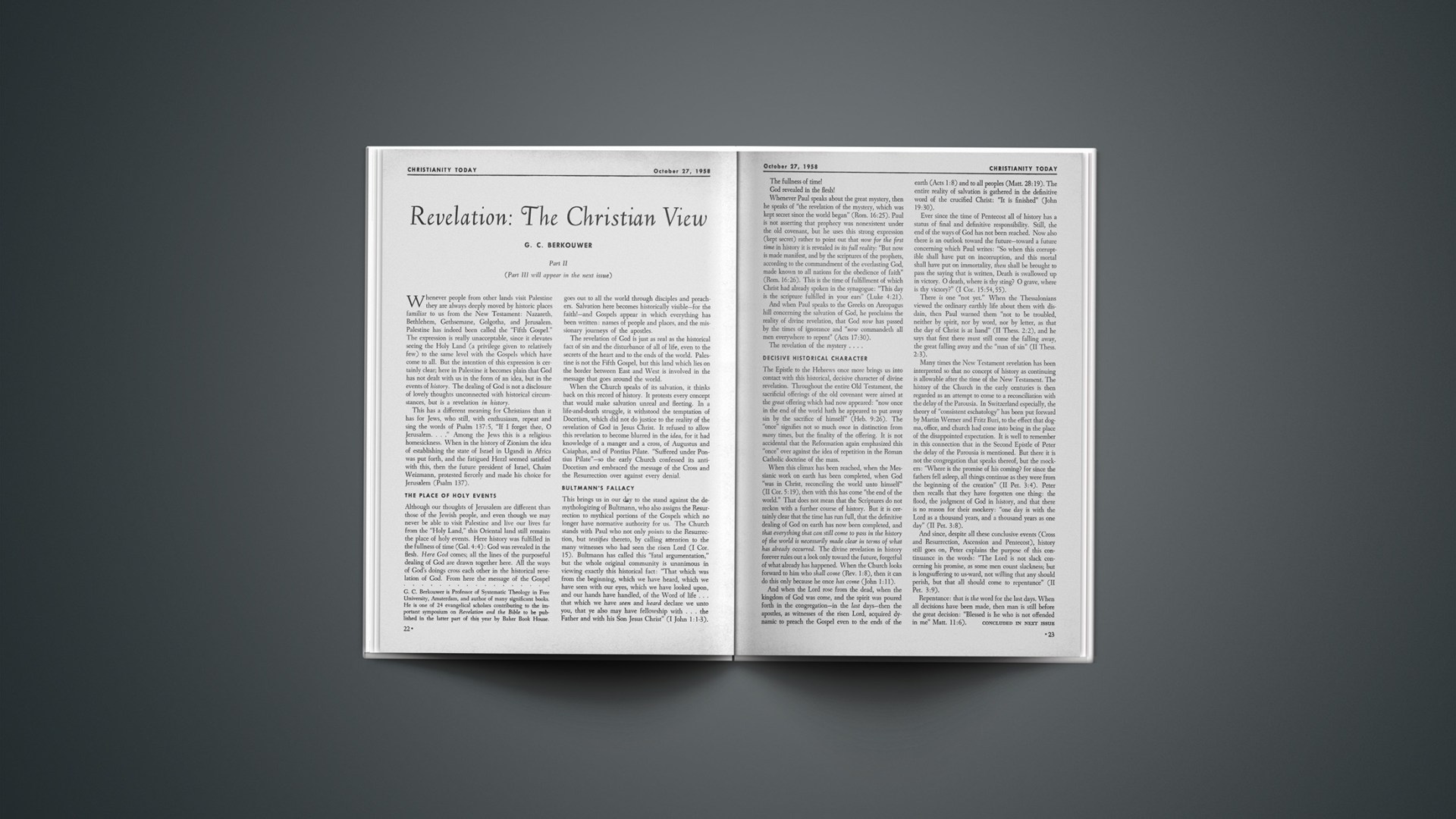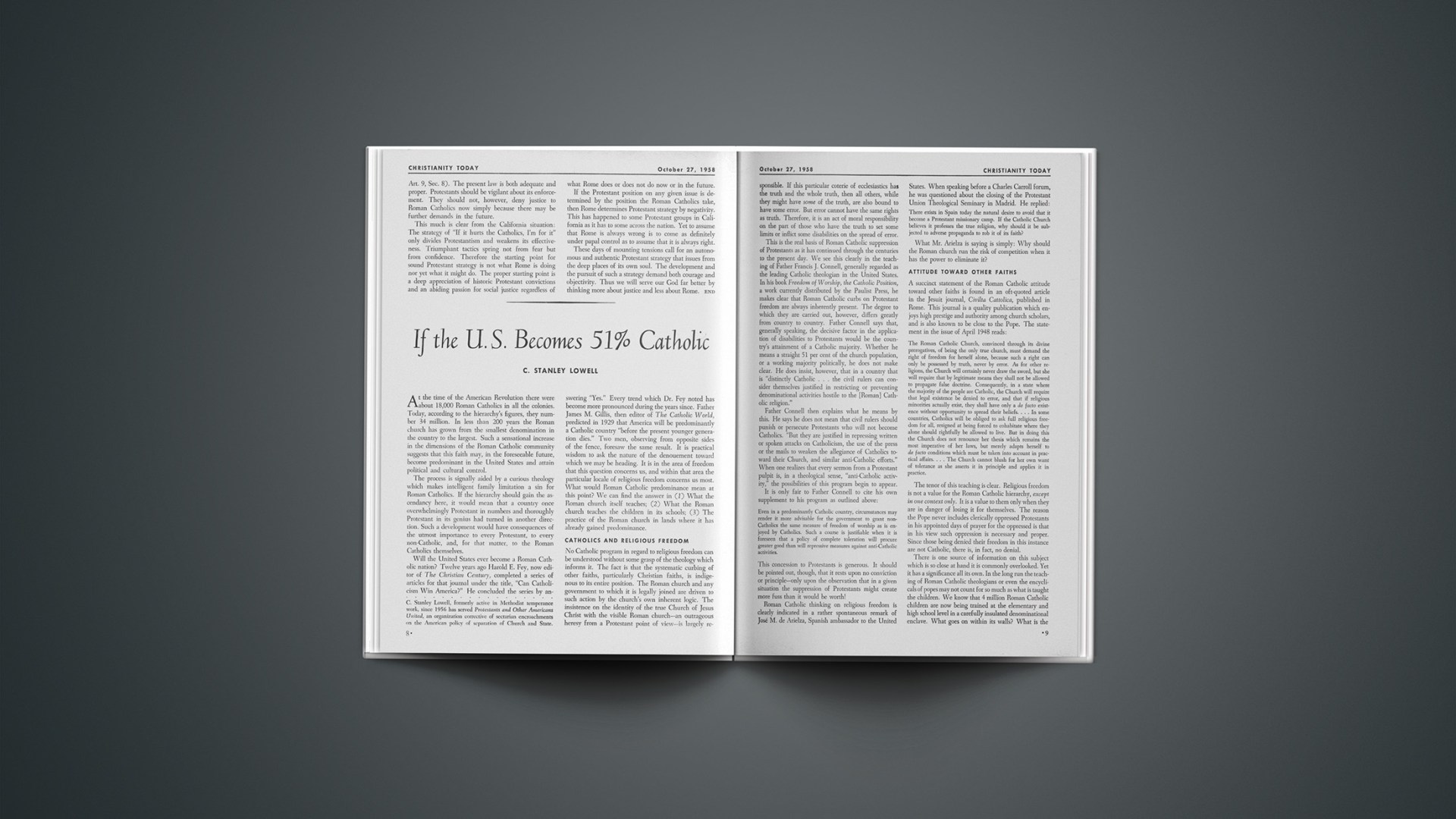PASTOR’S SERMON CLINIC
Many contemporary sermons are lacking in organization. Give your sermons the Connective Test. Listen to the tape of a recent discourse and check the number of times you have used the following:
1. And … aa-a-a-a-
2. And, as We were saying …
3. That, by the way, recalls an experience I had in …
4. Or, as the Irishman said when …
5. If I may return for a moment to the text …
To score, divide the number of occurences by the phrase number and multiply by the number of points, if any, in your sermon. If you have five or more instances of a phrase above, read the corresponding sentence below:
1. You have a strong feeling for structure. Your hesitation shows a commendable desire to choose words having some relation to what has been said.
2. Splendid organizational unity. You remember what you have said, and repeatedly echo it. Symphonic mastery of a motif.
(The We is the plural of a doctor of divinity.)
3. Deep thematic awareness. Each successive parenthesis (properly introduced ((note the shared experience (((should be revelant ((((but not necessarily to the first theme)))))))))) leads to an existential denouement.
4. This brilliant extemporized connection introduces the Jocular Parallel, known to Hebraists as the Wow Consecutive.
5. A dangerous redundancy. Returning to the text will not only interrupt the chain of association in your remarks, it may also raise extraneous questions in the minds of any wakeful hearers: what was the text? what does it mean? why did he leave it? You can readily imagine the embarrassment this might become to your liberties in the pulpit!
If your low score reveals weak structure, use this outline for two months:
Theme: A Cheering Thought
1. Illustrations of Cheering Thoughts
(Cheering Thoughts Cheer)
2. Illustrations of This Cheering Thought
(This Cheering Thought Cheers)
3. Concluding Illustrations
(How We Are Cheered!)
Various Cheering Thoughts must be supplied; at present we have none to offer.
EVOLUTION AGAIN
Gordon Clark’s appraisal of “the hypothesis of evolution” (Sept. 1 issue) provides a refreshing stimulus to Christian biologists at a time when Darwin and Darwinism are being re-evaluated from all sides. Prof. Clark’s most significant contribution is his emphasis on the varying and sometimes contradictory use of terms. It is important for Christians to realize that small changes—i.e. within a species or genus—are referred to as “evolution” as well as the amoeba-to-man, up-from-the-ape concepts. Likewise, it is good to hear a philosopher-theologian recognize that the kinds of Genesis are not identical to the species of biology and that the eighteenth century Linnaeus is not the final authority on the interpretation of Genesis 1. I feel that Prof. Clark’s article provides a good starting point for profitable discussion of both the facts and the fallacies of “evolution” by both creationists and evolutionists.
Assoc. Prof. of Zool.
Univ. of N. H.
Durham, N. H.
The true scientist as well as the true philosopher is searching for truth. So to assume that evolution must be atheistic is equivalent to Dobzhansky’s assumption that a Creator must be whimsical and capricious. To the biologist as a scientist the data with which he deals is thought of as being neither theistic nor atheistic in its own right. Such an interpretation must rest upon his presupposition as must his conclusions. In many cases the presuppositions make little or no difference in the actual conclusions. In others, however, the facts will support equally any of several conclusions, depending upon the basic assumptions.… That God could have created by evolution seems hard to deny in the light of either reason or Scripture (e.g. all the present races of man from Adam and Eve). But at present neither scientific data nor biblical exegesis gives us very clear cut limits as to where and when such a process might have been used for God or where and when (or if?) other creative processes were employed. Hence it seems to me that the Christian today can say only that his basic presupposition from Scripture is “God created the heaven and the earth” and that Christ is “both the First Principle and Upholding Principle of the whole scheme of Creation” (Col. 1:17, Phillips).… That there can be a scientific way as opposed to a biblical way is inconceivable, but that there can be a scientist’s view as opposed to a theologian’s view has been sadly demonstrated time and time again. But the scientist’s view—be it scientific or philosophical—no more changes the truth of the data of the Bible. Your editorial seems to be a bit derisive of science on the basis of this thinking as well as a bit smug theologically.… I couldn’t agree more than that our contemporary need is a real consistent evangelical philosophy of science that would not only convince Christian researchers that they can’t leave Christ at the door of their laboratory but would also suggest what difference He might make when they realized He was with them even there; that would give significance to both the correlations and the discontinuities; that would give satisfaction and relevance to the unknowable as well as the knowable.…
Prof. of Zool.
N. Dak. Agr. Col.
Fargo, N. Dak.
I was very much pleased to see this critique of evolution by our friend Gordon H. Clark. It seems to me that he does the Christian cause a real service by his analysis of the subject.
We as Christians need to realize that our reactions to evolution have not always been wise. We should also be aware of the fact that popular opinion favors evolution. Dr. Clark is careful to point out that the evolutionists sometimes betray certain hesitancies as when Howells admits that “there is also the mystery of how and why evolution takes place.”
I consider that the section, “A Lesson from Physics,” is especially pertinent in warning all of us that the results of science are always tentative and subject to constant revision. Also it is good to see that Dr. Clark points out difficulties in the argument due to the ambiguity of the term evolution.
On the negative side it should be said that whereas Dr. Clark makes it appear that evolutionists rule out God, it is still true that many do not. Darwin specifically mentions the Creator in The Origin of Species. Then too, many evolutionists do not state that their results are “assured” as intimated in the article.
Mankato State College
Mankato, Minn. Assoc. Prof. of Zoology
Clark has the facts straight and reaches a most valid conclusion. The kind of evolutionistic philosophy the Christian scientist rejects is the kind which claims that nature produces new basic types of organisms. We observe variation among organisms but neither the living nor the fossil record can demonstrate that all the processes of variation have ever produced anything basically new. I write this while attending the thirteenth annual meeting of the Society for the Study of Evolution at Ann Arbor. About one hundred of the world’s leading evolutionists are present, but the only empirical evidence they present is for variation within already-existing, well-marked basic types. Only wishful thinking at the speculative level of science can produce an evolutionistic synthesis. The Christian scientist has the serious task of informing the masses that no demonstrable evidence exists for the bestial origin of man; instead, the evidence portrays divine creation of all basic types of life. I greatly appreciate Clark’s article and your publication of it. It is a timely contribution to a very needy cause.
Biology Prof.
Emmanuel Missionary Coll.
Berrien Springs, Mich.
To recapitulate from Christianity’s point of view: scientism’s social engineer can spawn an anti-Christ, belongingness can express its kingdom-consciousness, and togetherness will be its bible as written by the tyranny of the majority. The parallel with Genesis 11:4 will be evident throughout. There is the same fight for recognition in making a name for oneself. “Lest we be scattered” betrays the age-old motivation of mankind. And in the basic revolt against authority only to surrender to authority of another definition we see the central disease of man’s soul. Group cooperation becomes surrender of the individual in the name of what is best for him. Thus does man seek to escape from the burden of choice in being as gods knowing good and evil and the trying to decide so often between them (Gen. 3:5). But the utopian good which the organization so benevolently offers is that peace of mind which only Jesus Christ can validly offer. It is the folly of sin and the fruit of his predicament that makes any man accept insufficient substitutes.
If theologians will remember that “kind” is not exactly defined in Scripture, and scientists will be careful to claim for evolution no more than is actually proven, special and natural revelation will be seen to be in no such conflict as some supposed a century ago when The Origin of Species broke upon the world.
Pittsburgh-Xenia Theological Seminary
Pittsburgh, Pa.
The conflict with Christianity is obvious—even the conflict with naked truth … against the phony [evolution] which provides a “scientific” base for social tyranny and humanistic blasphemy!
Evolution Protest Movement
Henniker, N. H.
I … believe that the theory of evolution is the Pandora’s Box from which all kindred evils such as higher criticism (negative) have sprung.
Mount Pleasant Christian Church
Bedford, Ind.
The Cadillac of Christian magazines for candid, cultured Christians with discernment and direction.
Detroit, Mich.
It is the best religious magazine I have met in my 86 years.
Markethill, Armagh, U. K.
LAMBETH ACTION
The action of the Episcopal and Anglican bishops … at the recent Lambeth Conference [Sept. 15 issue] … in approving birth control as a means of easing overpopulation … is remarkable because not long ago the Anglican church opposed so-called artificial birth control as vigorously as the Roman Catholic church. World population is now growing by … 47,000,000 a year. The Population Division of the United Nations estimates that the present world population will more than double … in the next 40 years.… As a result hundreds of millions of people in the world are hungry.… In their desperation they are susceptible to Communist … infiltration.… While the H bomb is only being stockpiled, the fuse of the population bomb is already lighted and burning.
New York, N. Y.


